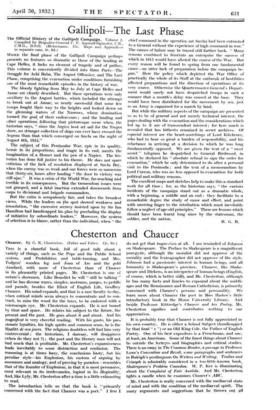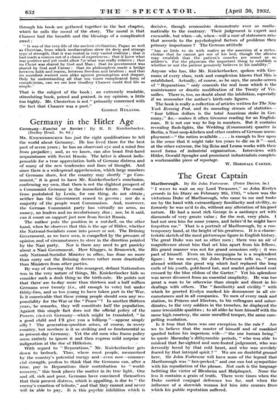Chesterton . and Chaucer
Chaucer. By G. K. Chesterton. (Faber and Faber. 12e. Od.)
Tuts is a cheerful book, full of good talk about a variety of things, such as the Pope and the Public School system, and Prohibition and table-turning, and Mrs. Todgers! wooden leg and Joan of Arc and the gold landard, with more of Chesterton than of Chaucer in its pleasantly printed pages. Mr. Chesterton is one of nature's showmen. Like Benedict he will " still be talking " and he has diverse wares, simples, nostrums, purges, to peddle and parade, besides the Elixir of English Life, Geoffrey Chaucer. His mind'expandk, and that is a rare -faculty to-day, when critical minds seem always to concentrate and to con- tract, to miss the wood for the trees, to be endowed with a microscopic eye. Mr. Chesterton expands. - He is not bound by time and space. lie relates his subject to the future, the present and.the pest.. He goes about it and about. And his magmficat is very cheerful reading. With his gusto, his pas. sionate loyalties, his high spirits and common sense, he is the Hazlitt de nos fours. The religious doubtless will find him very controversial ; the historians, I daresay, will disappicive (when do they not ?) ; the poet and the literary man will not hind much that is profitable. Mr. Chesterton's expansiveness leads inevitably to some distraction and confusion. The reasoning is at times. hazy, the conclusions hasty, but his peculiar style--his Euphuism, his custom of arguing by assonance and analogy; and of proving by paradox—resembles that of the founder of Euphuism-, in that it is most persuasive, most relevant in its irrelevancies, logical in its illogicality: And, like Ly1Y, Mr. Chesterton after a time is alittle exhausting
to read. "
• The introduction -tells us that ihe book is ."-primarily concerned with the fact that Chaucer was a poet." I fear I
do not get that imprez.,;on at all. I our reminded of Johnsot; on Shakespeare. The Preface to Shakespeare is a magniliCent panegyric, although the moralist did not apprOve of the morality and the lexicographer did not approve of the style. .Johnson had a passionate interest in human beings, and all humanity is Shakespeare's province. Chaucer, like Shake- speare and Dickens, is an interpreter of human beings (English, of course, which is better still), and Mr. Chesterton, although he has many facts and fancies to expound about the middle ages and the Renaissance and Roman Catholicism, is primarily, concerned with Chaucer's persons and imrsMitility. learn more about Chaucer the poet in Miss Harlow's little introductory book in the Home University Library. And beside Professor Kittredge's Chaucer and his Poetry, Mr. Chesterton signifies and contributes nothing to our appreciation. ,
It is probably true. that Chaucer is not fully appreciated in his own country. He is either a School Subject (handicappol by that final " e ") or an Old King Cole, the Father of English Poetry. One of his best expositors is a Frenchman, and one, at least, an American.. Some of the finest things about Chaucer lie outside the lectures and biographies and critical studies. There is an essay in The Common Reader, a passage in Professor Lowe's Convention and Revolt, some paragraphs and sentences in Raleigh's posthumous On Writers and Writing. Troilus and Criseyde is admirably considered in a too-little-known book, Shakespeare's 'Problein Comedies. W. P. Ker is illuminating about the Complaint of Fair .4nelida. And Mr. Chesterton lights a candle when he examines Chaucer's ABC,
Mr. Chesterton is really concerned with the mediaeval state of mind and with the condition of the mediaeval spirit. The many arguments and suggestions that he throws out all
through his book are gathered together in the last chapter, which he calls the moral of the story. The moral is that Chaucer had the breadth and the blessings of a complicated ereed : " It was of the very.life of the ancient civilization, Pagan as well as Christian, from which mediaevalism drew its deep and strange type ,of strength, that it. was rooted in very varied realities ; that it had miule a cosmos out of a chatis of experiences ; that it knew what was positive and yet could allow for what was really 'relative ; that its Christ was shared by God and Man ; that its government was shared by God and Caesar : that its philosophers made a bridge between faith and reason, between freedom and fatalism ; and that its moralists warned men alike against presumption and despair. Only by understanding all that ten times' Complicated form- of complication, can we see how Geoffrey Chaucer could find life so simple."
That is the subject of the book ;- an extremely readable, stimulating book, priced and praised, in my opinion, -a little too highly. Mr. Chesterton is not " primarily concerned with the fact that Chaucer was a poet."
• GEORGE RYLANDS.







































 Previous page
Previous page